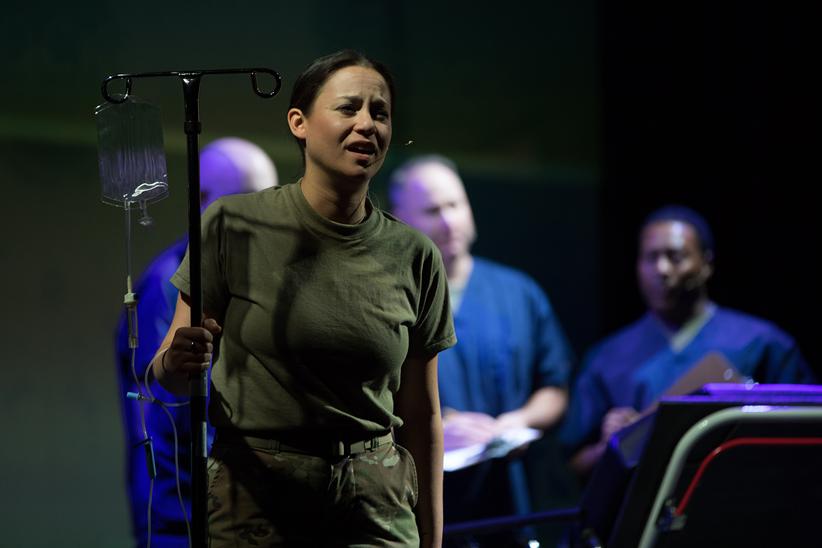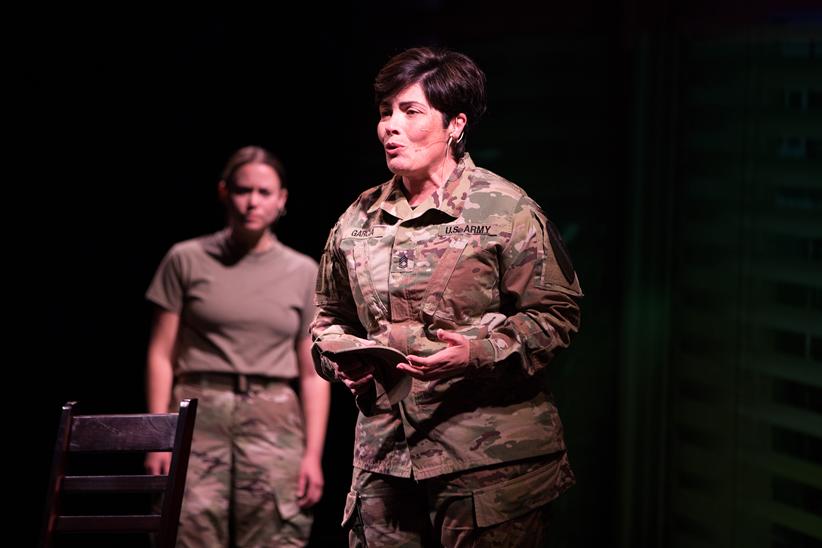A Song for the Army

Over the past decade and a half, a period during which the U.S. has been engaged continuously in Middle East conflicts, a sub-genre of military-themed operas has emerged, with works like Jeremy Howard Beck’s The Long Walk, Huang Ruo’s An American Soldier and David T. Little’s Soldier Songs. Now an opera about the lives of soldiers has emerged directly out of the military itself. The Falling and the Rising, an hourlong work from composer Zach Redler and librettist Jerre Dye, is the brainchild of Staff Sgt. Ben Hilgert, a tenor in the Soldiers’ Chorus of the U.S. Army Field Band. Based on dozens of interviews with Army veterans, the opera tells the story of an unnamed female soldier who is injured in a roadside attack, placed in an induced coma, and then, in a dreamlike state, encounters fellow service members who share their stories of sacrifice with her. The Falling and the Rising was premiered in April by the U.S. Army Field Band at Texas Christian University, with a cast drawn entirely from the Soldiers’ Chorus.
Hilgert, who enjoyed an opera career before joining the chorus in 2010, had long wanted to incorporate more operatic works into the chorus’ repertoire, but the idea of creating an original work didn’t come until 2015, when he attended OPERA America’s annual conference in Washington, D.C. “The [conference’s] theme that year was civic impact,” he says. “I was sitting there thinking, ‘Opera companies are scrambling to make themselves relevant in their cities, to build community, and justify their existence. And we [as soldiers] walk into our towns and immediately have a connection to almost everybody — wearing the uniform and having people come up and say, ‘Thank you for your service’ when they don’t even know what our service has been.” After the conference and subsequent consultations with OA staff, Hilgert says, “I knew I wanted to commission an opera that told veterans’ stories and to explore collaboration across the industry as broadly as I could.”
A year later, at OPERA America’s conference in Montreal, Hilgert presented his concept to a group of new-work producers, and, he recalls, “I wasn’t even off of the head of the table before Darren Woods came up to me, saying, ‘I want to champion this piece.’” Woods, then general director of Fort Worth Opera, helped assemble a group of co-commissioners consisting of Texas Christian University, Seattle Opera, San Diego Opera, Arizona Opera and Opera Memphis. Seagle Music Colony, where Woods is now artistic director, signed on as the work’s developer and produced its workshops.
For Woods, it was important that the piece be easily adaptable to a variety of performance settings, to reach the broadest audience possible: “What we challenged Jerre and Zach with was that this had to be a piece that could be done just with piano, not only with all the bells and whistles,” he says. “If it needed to be done in a high school gymnasium or an Army base, it had to be equally understood. We wanted it to be readily digestible to everyone who saw it — with no barriers to anyone who wanted to produce it.”

In composing the work, Redler made accessibility a priority. “We knew that this opera would be a first opera for a lot of people who wouldn’t normally go to the opera, not purely because it’s about military life, but because it’s aligned with an actual military organization,” he says. “The music is tonal and accessible, and people coming for the first time will be able to understand the text without subtitles.”
The U.S. Army was not a part of the commissioning consortium, since that would have been an implicit endorsement of other organizations, which is forbidden under military code. Still, its involvement set the tone for the piece: apolitical, celebratory of service, and authentic to the lived experiences of soldiers. “We wanted to create a story that was about something more than pain and suffering,” says Dye. “We wanted to create a story that was about human connection. The soldiers we talked to said again and again: ‘I don’t know what I’d do without my battle buddies.’”
The goal of The Falling and the Rising, Hilgert says, was not just to honor veterans’ stories onstage and provide catharsis to the service people in the audience, but also to help civilians more fully understand military service. The message comes across starkly at the opera’s end, with a chorus including the repeated words: “I give my life. / This is my vow. / I’ll die for you.”
“With less than one percent of Americans joining the military, we are in danger of civilian populations growing out of touch with what it means to serve,” says Hilgert. “We wanted to bridge that gap.”
This article was published in the Summer 2018 issue of Opera America Magazine.

Nicholas Wise
Nicholas Wise is OPERA America's senior manager of marketing and publications and the associate editor of Opera America Magazine.





